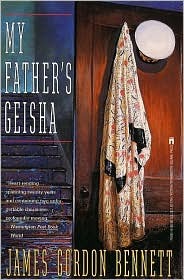I picked a secondhand copy of James Gordon Bennett’s novel, My Father’s Geisha up at Goodwill for $0.70.
Description from back of book:
Teddy’s on his way to an ulcer before he’s old enough for a driver’s license. His silver-screened sister Cora is convinced that “Army families are all alike, which is why they have to keep us moving.” And move their family does, following first the blue then the red line in the road atlas to their next assignment. When every parental confrontation seems to end in stony silence, Cora predicts a permanent separation (“I’ve seen the movie”). Teddy wishes his heart could be freeze-dried then thawed back to life, so that from that moment on, everything and everyone might be absolutely new…
[I might also point out that, interestingly, almost every sentence of that description is somewhere in the book.]
Review:
I can’t honestly say I liked it. But I can’t say there was anything intrinsically wrong with it either. I much preferred the first half of the book, when the main character and his sister were still children. I liked that the narrative addressed very adult issues (life in the military, a crumbling marriage, etc) from the hazy perspective of youth. I found the last half, their adulthood, disappointing though. I’m afraid I lost sight of the moral of the story at that point.
I realise that part of the running theme of the book was the family’s inability to communicate, but I felt really cheated by never getting to see the father called out for being an insensitive ass. The happy ending felt brittle. In the sense that it was only happy for some and only possible because the mother was finally dead. It almost made her feel like the bad guy for hindering that very eventuality. But come on, she wasn’t the ever absent philander! Did the father and his mistress really deserve a happy ending at everyone else’s expense? Was the fact that the heavy price the family paid for it was years past suddenly make it OK? I didn’t think so, at least not without having to concede some sort of apology. Yes, real life is messy and maybe that makes this book more gritty and real, but I found it a most unsatisfying read. I wanted to see the father forced to face the consequences of his own decisions and the children finally given a little consideration. I never got it and I finished the book a bit disgusted with the lot of them.
I did find the writing excellent (though the passage of time was often unclear) and I enjoyed some aspects of the characters. For example, the fact that Cora was so often patronised and ignored, but was also almost always right. Chapter 2, Brats, was by far the best of the book IMO. I wouldn’t discourage anyone from reading the book and I’m not disappointed to have read it myself. Can’t say I enjoyed the last half all that much though.
